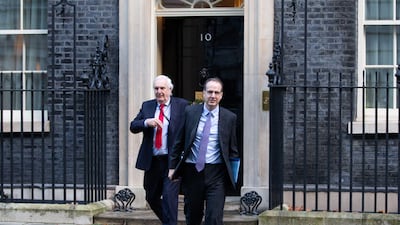That Martin Reynolds finds himself at the centre of political controversy is baffling to those who know him.
“Highly competent”, “kind” and “well-meaning” are the words used by some who worked alongside him in government, including during his time as Britain's ambassador to Libya.
His skills and broad experience, as well as an ability to work alongside high-profile politicians, are what led to him to one of the most influential jobs in the Civil Service.
As principal private secretary, PPS, to the prime minister he is the person sitting in on every meeting, bar those deemed “political”, wielding immense influence.
But that place at the heart of power is threatened by the invitation he sent out for a drinks party in Downing Street’s garden. On Wednesday, Mr Johnson apologised for attending the gathering.

The party on May 20, 2020 took place at the height of an intense period during the UK's first lockdown when 35,000 people had died with Covid-19 with hospitals were under severe strain.
It is understood that Mr Reynolds, 53, immediately realised the error in sending out the apparent rule-breaking memo and it was reportedly deleted. But his lawyer’s eye for detail had momentarily let him down. That was an unusual slip for a man who had long shown he had intelligence and ability.
A pupil at Oxford’s highly academic Magdalen College School, Mr Reynolds gained the top results required for a place at the University of Cambridge studying law. On top of study he also pursued his enjoyment of classical music and mountain climbing before finishing his legal education at the University of York.
Possibly tempted by the salary and prestige, he took a job with a law firm in the City of London for three years before deciding on a more interesting and adventurous career in the Foreign Office in 1997.
Now in his 30s, he steadily made his way into more senior roles, dealing mostly with the legal and political ramifications of the EU's enlargement from 2004, during which 13 more countries joined the bloc.
He was based in Brussels until he was given his first taste in a diplomatic role as British deputy high commissioner in Pretoria, living in South Africa for three years until 2014.
It was then that his career began its significant upwards trajectory when, in his mid-40s, he became principal private secretary to the foreign secretary in 2014.
Initially, he acted as PPS to Philip Hammond before the politician was appointed chancellor following the post-Brexit resignation of David Cameron as prime minister in 2016.
“Martin Reynolds was a highly competent and very serious person who had a good reputation of just being highly skilled at his job,” Tobias Ellwood, MP, who was a Foreign Office minister at the same time, told The National.

"We found him kind and well-meaning, ready to laugh at the right moments," added a Foreign Office colleague.
To the surprise of many, the new prime minister, Theresa May, appointed Boris Johnson as her foreign secretary in the new Brexit era.
Mr Reynolds's clear thinking, experience and ability to absorb the eccentricities of Mr Johnson led to a successful working relationship. He handled the detail while his boss did the politics, which is generally the main role for a PPS.
But during the fractious years of Ms May’s premiership, Mr Johnson resigned as foreign secretary in July 2018.
The following April, Mr Reynolds was given the tricky posting to Libya, a nation mired in civil war.
Those who worked alongside him in Libya considered him someone who tried hard to understand his brief. But the security situation meant there was little time for him to venture much beyond the Tripoli embassy as he worked with the UN and Libyan government to set up nationwide elections in an attempt to end the civil war.
In one tweet during Ramadan, he called on the warring parties to “return to political dialogue" while expressing his “grief” at seeing Libyans suffer during the holy month.
A few months after becoming prime minister in 2019, Mr Johnson’s PPS resigned. His admiration and respect for Mr Reynolds was such that he recalled him from Tripoli to take on the role.
During his time in Downing Street, Mr Reynolds has acted as the prime minister’s key fixer, particularly during the pandemic.
Until his fateful email was leaked earlier this week, he had largely remained in the shadows, albeit photographed occasionally behind Mr Johnson.
He will clearly be at the centre of attention once the investigation into the Downing Street party concludes. It is said his aspiration is to leave the political frontline and return to diplomacy with an ambassador’s post, potentially returning to the Middle East.
That would be a fresh start for a man who has been dragged from the administrative shadows into the fulcrum on political warfare.


